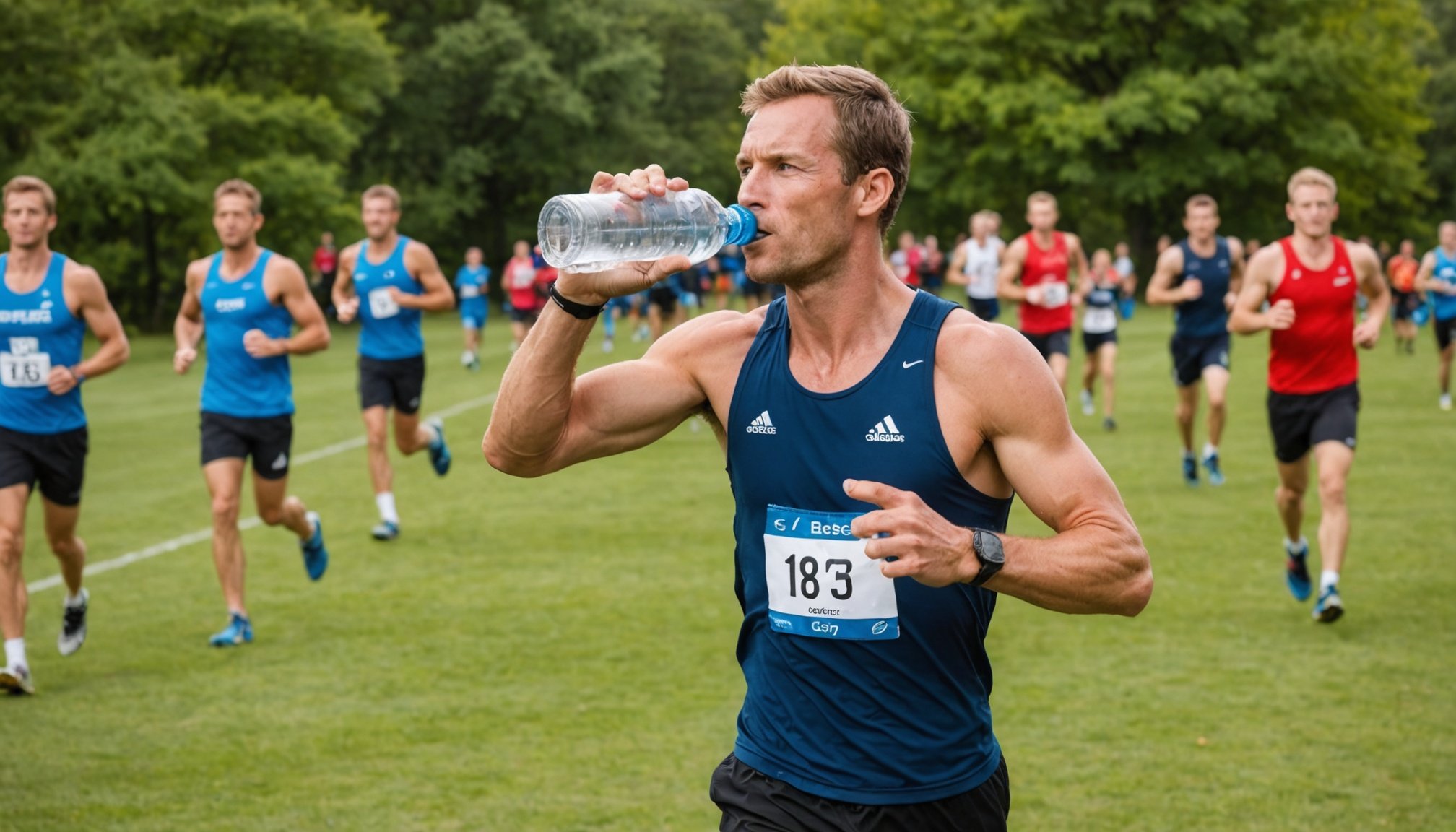Understanding Hydration Needs for Endurance Athletes
For endurance athletes, hydration plays a crucial role in maintaining performance. The body’s fluid balance directly affects one’s ability to sustain prolonged physical activity. Fluid requirements vary significantly among athletes, influenced by factors such as body weight, ambient temperature, and the intensity of exercise. Larger individuals and those exercising in hot climates typically require more fluids for optimal performance.
Additionally, the inclusion of electrolytes such as sodium, potassium, and magnesium in an athlete’s hydration strategy is vital. These electrolytes not only help replace those lost through sweat but also support nerve function and muscle contractions, ensuring sustained energy and minimizing the risk of muscle cramps.
Also to read : Ultimate Marathon Prep: Key Tapering Strategies for Your Final Week Before Race Day
Endurance athletes should monitor their fluid intake closely. A common strategy is to weigh oneself before and after exercise; a weight loss greater than 2% indicates insufficient hydration. Regular monitoring and adjustments help match hydration levels to specific exercise intensity and environmental conditions, ensuring effective performance.
Remember, signs of inadequate hydration, like dizziness and excessive fatigue, should not be ignored. Tailoring hydration strategies to match individual endurance athletes’ needs allows for better performance and health during demanding physical activities.
Also read : How Anaerobic Threshold Training Boosts Cyclist Performance: A Deep Dive into Its Impact
Strategies for Maintaining Hydration During Events
Staying hydrated is crucial for success in endurance events. Pre-race preparation involves more than just packing your gear; effective hydration strategies begin days before. In the days leading up to the event, drink ample fluids, focusing on water and electrolyte-enhanced beverages. Check your urine color—it should be pale, indicating good hydration levels.
During the event, it’s vital to maintain consistent hydration. Here’s a tip: drink small sips of fluids every 15-20 minutes rather than large amounts at once. This approach ensures your body efficiently absorbs fluids while preventing stomach discomfort. Include both water and sports drinks to replenish electrolytes lost through sweat.
After the event, focus on recovery hydration strategies. Your goal is to replace any fluid deficit experienced during the event. A useful guideline: for every pound lost, drink 20-24 ounces of electrolytes. This helps rehydrate your body and support muscle recovery, minimizing the risk of dehydration-related issues.
Hydration strategies are not one-size-fits-all. Tailor your approach to personal needs, considering factors like your sweat rate, climate, and event duration. Staying ahead of your hydration needs sets you up for peak performance and successful recovery.
Practical Tips for Implementing Hydration Plans
Implementing effective hydration plans is crucial for athletes participating in endurance sports. Below are several strategies designed to help maintain optimal hydration levels.
Designing a Hydration Schedule
Creating a structured hydration schedule is essential for both training and competition. To begin, assess your sweat rate by weighing yourself before and after workouts. This information helps determine fluid loss during exercise. Customise your schedule to include specific times for fluid intake, ensuring that you drink regularly rather than relying on thirst cues alone. Adjust your schedule based on climate conditions and training intensity to maintain peak performance.
Choosing the Right Hydration Products
Selecting appropriate hydration products that cater to the athlete’s needs and preferences is a key element of success. Consider electrolyte-enhanced drinks to replenish vital salts lost through sweat, as well as carbohydrate-rich options for sustained energy. Experiment with different flavours and textures to find products that you enjoy and can tolerate well during physical activity.
Monitoring Hydration Levels
Accurately monitoring hydration levels ensures your body’s readiness for performance. Utilise various methods like urine colour assessment or digital hydration tools to track status and adapt plans as needed. By regularly checking, you can fine-tune your hydration strategy for optimal results.
Consequences of Dehydration on Performance
Dehydration effects on athletes’ performance can be severe, impacting both physical and psychological health. Physically, the body experiences symptoms such as increased heart rate, reduced endurance, muscle cramps, and dizziness. These dehydration effects hinder an athlete’s ability, sometimes even forcing them to stop activity prematurely. Diuretics exacerbate these issues.
Psychological effects are equally concerning. Dehydration impairs cognitive functions, leading to difficulties in concentration, decision-making, and overall mental alertness. Athletes might struggle during competition or training because of impaired focus, impacting their performance considerably.
If hydration isn’t managed properly over time, there are potential long-term consequences. Athlete health can decline, with increased risk of serious conditions like kidney stones and urinary tract infections. Consistent dehydration may also lead to chronic fatigue and diminish an athlete’s capacity to train, resulting in poor performance impact over a career.
Thus, maintaining appropriate hydration levels is crucial for athletes to remain in peak condition. A balanced intake of fluids before, during, and after exercise can mitigate dehydration effects and preserve both physical and mental performance levels. Proper strategies ensure dehydration doesn’t negatively affect an athlete’s short-term output or long-term health.
Real-Life Examples and Case Studies
In the realm of athletic performance, case studies provide valuable insights into the practicality of hydration strategies. An inspiring example comes from a professional triathlete who enhanced his performance by implementing a structured hydration plan. This athlete, once marred by frequent muscle cramps and fatigue, sought expert and expert advice for a tailored solution. By rigorously monitoring his fluid intake and electrolytes, he reported significant improvements in endurance and overall results.
Athlete testimonials further underscore the importance of informed hydration. Many athletes share experiences of transitioning from generic to bespoke strategies, learning firsthand the impact on performance. A marathon runner, for instance, avoided hyponatremia, a common pitfall, through personalized advice from a nutritionist.
Yet, as insights from nutritionists suggest, common hydration mistakes often occur. Misjudging fluid needs based on temperature or intensity, failing to consume the right kind of electrolytes, and inadequate pre-race hydration are frequently highlighted errors.
Coaches emphasize the necessity of varied hydration plans tailored to specific endurance events. For elite endurance athletes, such as triathletes or marathoners, they customize guidelines to incorporate optimal fluid and sodium intake, thus preventing the detrimental effects of dehydration or overhydration.





